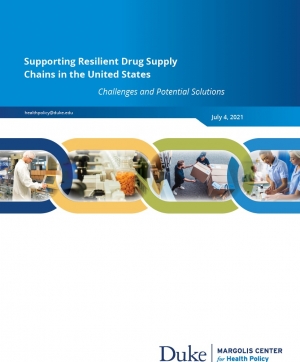
Policy Brief
Supporting Resilient Drug Supply Chains in the United States
Published date
A resilient drug supply chain ensures that patients have safe and effective medications, in adequate quantities, when they’re needed. Unfortunately, shortages of life-saving and life-sustaining medications have severely affected many aspects of patient care for years, in large part because of the lack of resilience in drug supply chains. COVID-19 has exacerbated these challenges, involving products ranging from the generic drugs critical for intubated patients to the difficulties in scaling up vaccine production. These problems have led to increased policymaker interest in examining drug supply chain resilience critically in order to avoid further disruptions in the current pandemic and reduce the risk of shortages in the future. With growing interest in legislative and regulatory reforms to improve the reliability and robustness of U.S. drug supply chains, it will be crucial to achieve a common understanding of how to enhance supply chain resilience.
In this issue brief, we describe the components of modern drug supply chains and the implications of these components for supply chain resilience. We then assess current issues with U.S. drug supply chains and propose policy solutions to those issues. The CARES Act of 2020 introduced several reforms to drug supply chains, most notably requiring manufacturers to report more information to FDA and ordering the Department of Health and Human Services (HHS)
and the National Academies of Sciences, Engineering, and Medicine (NASEM) to conduct a comprehensive review of medical supply chains. The White House’s recently released “100-Day Review” on Building Resilient Supply Chains proposes additional worthwhile steps related to supply chain mapping and resilience and quality assessments.
However, the “100-Day Review” report does not propose a methodology to measure supply chain resilience or translate critical supply chain information to purchasers, and it does not adequately emphasize the importance of preparing for future public health emergencies by ensuring availability of advanced biologics such as vaccines and monoclonal antibodies. We believe more needs to be done to correct a lack of effective market incentives, underinvestment
in manufacturing quality and supply chains, intense geographic concentration, and a general lack of transparency that have made drug supply chains less resilient in America. Based on our assessment, government action to align financial incentives, invest in new manufacturing technologies like continuous manufacturing, on-demand manufacturing, and modernized inspection and sterilization equipment, and introduce greater transparency may be useful steps toward alleviating these issues.
Duke-Margolis Authors

Thomas Roades, MPP
Policy Research Associate

Mark McClellan, MD, PhD
Director of the Duke-Margolis Institute for Health Policy
Robert J. Margolis, MD, Professor of Business, Medicine and Policy
Margolis Executive Core Faculty
